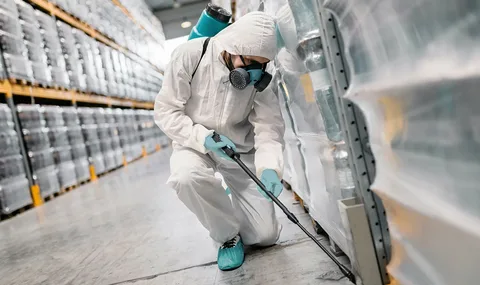Running a business is not easy. You work hard to keep customers happy, make profits, and grow your brand. But one hidden problem can damage everything very quickly. That problem is pests. Rats, cockroaches, ants, flies, and termites can sneak into your workplace and create chaos. This is where commercial pest control becomes very important.
In this article, we will explain what commercial pest control is, why it matters, how it protects your reputation, and what steps you can take to keep pests away. Everything will be explained in simple words so anyone can understand.
What is Commercial Pest Control?
Commercial pest control means using professional services to remove and stop pests from coming into places like restaurants, hotels, shops, warehouses, offices, and factories. Unlike home pest control, it is focused on businesses where one pest problem can affect many people at once.
For example, imagine a restaurant where customers see a cockroach on the table. That single sighting can cause bad reviews online and push people to avoid the restaurant. This shows how powerful pest control is for business reputation.
Why Pest Control is Important for Businesses
Pest control is not just about killing insects. It is about protecting money, reputation, and safety. Here are the main reasons:
Financial Losses
Pests can cause serious damage.
-
Rats chew wires, which can lead to fire risks.
-
Termites eat wood, weakening walls and furniture.
-
Insects contaminate food, making it unsafe to sell.
For businesses in food, healthcare, and retail, this can mean big financial losses. Sometimes products must be thrown away or recalled, which costs even more money.
Reputation Damage
Customers trust a business that looks clean and safe. If they see pests or hear about infestations, trust is broken. Negative reviews spread quickly online. For restaurants and hotels, one pest problem can turn away hundreds of customers.
Operational Disruptions
If pests infest a workplace, operations may need to stop. Staff may feel unsafe working there. This means lost time, fewer sales, and lower productivity.
Regulatory Compliance
Health and safety rules are very strict, especially in industries like food, healthcare, and hospitality. If an inspector finds pests, the business can be fined or even shut down.
Cost-Effective Pest Control Tips
Businesses can prevent many pest problems by taking simple steps:
-
Keep it clean: Always clean floors, counters, and food areas. Throw away garbage in closed bins.
-
Seal entry points: Close gaps in doors, windows, and walls where pests can sneak in.
-
Organize storage: Keep items in sealed containers and off the ground. Rotate stock to avoid long storage.
-
Inspect often: Check kitchens, basements, and storerooms for droppings or nests.
-
Hire professionals: Pest control companies provide long-term solutions and regular checks. This is the best way to avoid repeat problems.
Benefits of Commercial Pest Control
Hiring professionals has many benefits:
-
Lower repair costs and product losses.
-
Fewer interruptions to daily business.
-
Compliance with health regulations.
-
Higher customer trust and loyalty.
-
Protection of brand reputation.
In short, it saves money and protects your image.

How is a pest control business valued?
The value depends on customer contracts, reputation, revenue, and long-term client relationships. A pest control company with more regular clients is valued higher.
What is pest control and why is it important?
Pest control means managing and stopping pests like rodents, termites, or insects. It is important because it protects health, property, and business reputation.
What are the disadvantages of pest control?
Some treatments use chemicals that can affect the environment if not handled properly. Costs can also be high if infestations are severe.
Why Reputation Matters Most
A clean and safe environment tells customers that you care about them. It builds trust, and trust builds long-term success. On the other hand, one pest problem can destroy years of hard work.
Investing in commercial pest control is not just about avoiding pests. It is about protecting your future.
If you want to read more about business, reputation, and safety, visit Usa Time Magazine for trusted insights.
FAQs
Who needs commercial pest control?
Any business that deals with people, food, or products should have it, including restaurants, hotels, offices, and warehouses.
What types of pests are common in businesses?
Rodents, cockroaches, termites, ants, and flies are most common.
How often should a business use pest control?
At least once every few months or as recommended by experts.
Does pest control affect employees?
Modern pest control is safe when done by professionals. Employees may only need to stay away during treatment.
Can pests return after treatment?
Yes, if preventive steps are not taken. That’s why regular checks are important.
Is pest control expensive?
It can cost money, but it is cheaper than the losses from damaged goods, fines, or bad reputation.
Can pest control help customer trust?
Yes. A clean and pest-free environment shows professionalism and care.
What industries are most at risk of pest problems?
Food service, hotels, healthcare, retail, and storage businesses are most at risk.
What happens if pests are ignored?
Ignoring pests can lead to financial losses, shutdowns, and long-term reputation damage.
Is professional pest control better than DIY methods?
Yes, because professionals use advanced methods and provide ongoing protection.
